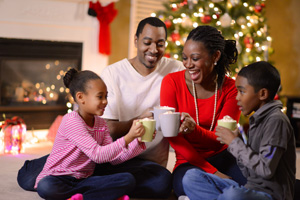In early December, many families make or finalize their holiday plans. Like most families this year, those affected by ADHD are also balancing health precautions and family dynamics along with the best ways to maintain treatment plans and routines.
Pandemic fatigue has set in for many people. The upcoming holidays may seem like the perfect outlet but can pose risks, even when celebrated among just a few people, small family groups, or a closed “bubble.”
For people with ADHD, the impulsivity and excitement of the season has a special draw, along with lower levels of caution. In extended families where members have differing views on the level of caution needed to ensure public and personal health safety, the challenge can seem overwhelming.
So, what can you do this holiday season?
Having difficult conversations
“You’ll need to get creative and have honest (and possibly uncomfortable) conversations with every member of your family about their individual safety needs and risk tolerances,” says Emily Landon, MD, of the University of Chicago Medicine. “Once you’ve done that, you’ll want to develop plans, more plans, and back-up plans so you’re prepared and ready to make any last-minute adjustments if someone wakes up on Christmas morning with a sore throat.”
It can be difficult to start or continue these conversations. No one wants to cause someone else to be unhappy, and many adults with ADHD are sensitive to the possibility of rejection or disappointing other people. Starting the conversation from a shared set of hopes for the season can make the discussion go a little better, though.
“I do think we should start with: What are our core values?” says psychiatrist Aderonke Pederson, MD, of Northwestern University’s Feinberg School of Medicine. “As a family, what is the number one thing that’s important to us? And that is that we’re able to protect each other, and we’re able to care for each other. That we can all agree on.”
Making plans together
Public health officials are recommending families celebrate in small groups, ideally with their household members or in closed “bubbles,” which are small groups of people who do not socialize outside of that closed group.
The Johns Hopkins Bloomberg School of Public Health offers suggestions families can use to make their holiday plans:
- A virtual gathering instead of face-to-face
- A quarantine period for all attendees before attending, and COVID tests if possible
- Wearing masks indoors
- Celebrate outdoors instead of indoors
- Ensuring enough space for physical distancing
- Limiting the number of households included and keeping the number of people small
- Shorter celebrations
- No eating or drinking indoors, or, if this must happen, seating households together with 6 feet or more in between tables
- Good ventilation if indoors; open windows and doors and tell your guests to dress warmly
ADHD during the holidays
The excitement of the holiday season can lead to overspending, disrupted routines, and questions from other family members about treatment plans. The additional stress of navigating the holidays during a public health crisis can compound all of these concerns.
The experts suggest ways to manage these concerns:
Accept that not everything will go as planned or will be like previous years, but that will be okay. We are not perfect people and our families are affected by ADHD. There will be a few bumps in the road, plans and traditions will have to change, and events this year may need to be accepted as “good enough.” By accepting things as they are, and practicing mindfulness in the process, we can enjoy things as they are.
Be practical in your plans. Celebrations don’t need to be elaborate. Simple, practical events that bring together your family are more memorable than ones that cause stress and frustration.
Keep family rules simple and maintain routines as much as possible. Review with your children when necessary; you might consider posting a colorful sign that lists your family’s rules and routines to help keep them in mind. It can also help you to keep your daily routine handy, either posted at home or in your daily notebook, to help you stay on track.
Don’t compare yourself to others. This is a trap that many adults affected by ADHD fall into—comparing themselves to friends, family members, or even the neighbors, and judging themselves as being lesser than. During the holiday season, with brightly decorated houses and social media posts highlighting other people’s plans, it’s easy to be drawn into this trap.
“It is easy to think, ‘they have it all together, why can’t I? What is wrong with me?’” says HealthCentral writer Eileen Bailey. “No two families celebrate the holidays exactly alike. Each family has different traditions. How your friends or neighbors celebrate should not dictate how you celebrate yours. Instead of trying to live up to what you think others expect, work on creating your own traditions, ones that fit in with your lifestyle and values.”
Looking for more ideas for celebrating this year?
- Safely Home for the Holidays
- Ask the NRC Podcast: ADHD Holiday Tips: The Reverse Planning Strategy
- Make Your Plan for Managing the Holidays
- Create Holidays That Work for You
- Stay Cool Through the Yule
- Advice on ADHD Advice
Join the discussion: How does your family plan to celebrate this year?

